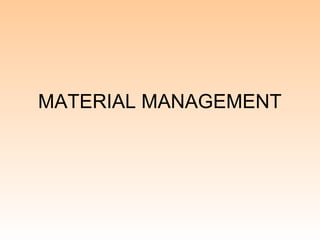
Material management
- 2. Definition It is concerned with planning, organizing and controlling the flow of materials from their initial purchase through internal operations to the service point through distribution. OR Material management is a scientific technique, concerned with Planning, Organizing &Control of flow of materials, from their initial purchase to destination.
- 3. AIM OF MATERIAL MANAGEMENT To get 1. The Right quality 2. Right quantity of supplies 3. At the Right time 4. At the Right place 5. For the Right cost
- 4. PURPOSE OF MATERIAL MANAGEMENT •To gain economy in purchasing •To satisfy the demand during period of replenishment •To carry reserve stock to avoid stock out •To stabilize fluctuations in consumption •To provide reasonable level of client services
- 5. Primary •Right price •High turnover •Low procurement •& storage cost •Continuity of supply •Consistency in quality •Good supplier relations •Development of personnel •Good information system Objective of material management Secondary •Forecasting •Inter-departmental harmony •Product improvement •Standardization •Make or buy decision •New materials & products •Favorable reciprocal relationships
- 6. Economy in material management •Containing the costs •Instilling efficiency in all activities
- 7. Four basic needs of Material management 1. To have adequate materials on hand when needed 2. To pay the lowest possible prices, consistent with quality and value requirement for purchases materials 3. To minimize the inventory investment 4. To operate efficiently
- 8. PROCUREMENT 1. Directorate general of supply & disposal (DGS & D, Govt. Of India] 2. Medical stores depot (M. S.D. Government of India, Ministry of H & FW] 3. Private or public sector undertakings. 4. Receiving donations.
- 9. Procurement cycle • Review selection • Determine needed quantities • Reconcile needs & funds • Choose procurement method • Select suppliers • Specify contract terms • Monitor order status • Receipt & inspection
- 10. Objectives of procurement system •Acquire needed supplies as inexpensively as possible •Obtain high quality supplies •Assure prompt & dependable delivery •Distribute the procurement workload to avoid period of idleness & overwork •Optimize inventory management through scientific procurement procedures
- 11. Points to remember while purchasing •Proper specification •Invite quotations from reputed firms •Comparison of offers based on basic price, freight & insurance, taxes and levies •Quantity & payment discounts •Payment terms •Delivery period, guarantee •Vendor reputation (reliability, technical capabilities, Convenience, Availability, after- sales service, sales assistance) •Short listing for better negotiation terms •Seek order acknowledgement